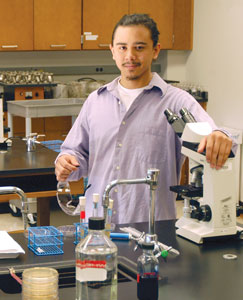WCC adds biotechnology program to course list beginning this term
By Phyllis Moore
Published in News on August 14, 2008 1:47 PM
With trends shifting toward alternative fuels and a growing need for skilled lab technicians, Wayne Com-munity College is responding by introducing a two-year program in agricultural biotechnology this fall.
The two-year program leads to an Associate in Applied Science degree, said Gene Smith, division head of arts and science.

Photo submitted
Wayne Community College student Theodore Brosseau poses in the microbiology laboratory. The college will be introducing a new two-year program this year, resulting in an Assocate in Applied Science degree.
"It seems to be a good fit," he said. "Wayne County is an agriculture community and biotechnology is a new industry."
The course of study also focuses on animal science. Graduates will be prepared for jobs from research assistant to a biologist or chemist.
"We're trying to prepare students to be employed in some of the industry areas we have in Wayne and Sampson counties," Smith said. "When we were looking at this program, there were several community colleges in North Carolina that were looking at becoming involved in biotechnology. ... We were trying to come up with some niche so we could fit in and be part of the biotechnology movement. You hear things like biofuels, or somebody doing something with chicken litter -- that's something we might be interested in."
Wayne Community has had a proactive approach to meeting the supply-and-demand of the workforce, Smith said. Providing training in line with the ensuing job market has meant keeping an eye out to the future.
"We have N.C. Bionetwork, which is part of the North Carolina Community College System, that is designed to help replace jobs lost in the agriculture and textile industry throughout North Carolina with biotechnology," he said. "When we started looking at this program, we contacted Goldsboro Milling and Case Farms and the N.C. Department of Agriculture. They indicated there's a need for trained lab workers."
Some industries have been "hiring people off the farms" and training them for jobs, Smith explained. So it makes sense to offer appropriate training in advance.
The college has received $199,000 in grants in the last two years to equip a lab and to help design a multi-media classroom.
An example of cutting-edge technology purchased through the funding includes a thermocycle, which takes a small amount of DNA and allows it to replicate itself over and over, Smith said.
"We also have two models of a cow and a pig, so students can take apart the different organs," he said. "We have purchased incubators and digital pipettes (used to measure out DNA and chemicals)."
The goal is to enroll 20 students in the program, with efforts under way to recruit them.
"We don't have students right now, but we do have increased students in the biotechnology program," Smith said. "They'll be taking some of the same courses, but it's not in the same program."
In anticipation of the program's success, agricultural technology has been listed as one of the top 10 programs offered at the college. Scholarships are being offered to entice students to sign up, with applications available at the school's financial aid office.
"We've also taken it to the high schools and will continue doing that during the coming year," he said. "It lets high school students be aware of what we have to offer."
Courses will be offered in a variety of ways, including the traditional classroom and lab time, as well as "hybrid courses" which feature a day or two a week in class and the remaining day option of working online.
There will also be opportunities for on-the-job training, introduced in year two of the program.
